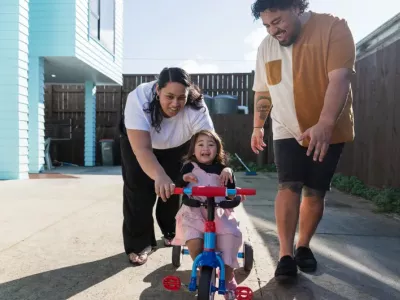Reframing routines – helping our kids cooperate

Getting our kids to cooperate with us can be a daily challenge. Our toddlers might not want to go to sleep at night. Our school-age children might complain about having to eat their dinner. Our teens might refuse to do much at all. You might find yourself thinking: ‘Can’t they just cooperate with me a little?’
When it comes to helping encourage your child to cooperate, there is a strategy that might seem simple, yet it can really work: using routines.
What is a routine?
A routine is how we organize and schedule events, activities, and tasks in a set way. In the home, they can be used for lining up things like what children can do before going to bed, how they can prepare for school, or setting regular mealtimes. Typically, parents or caregivers set up routines, and they often involve other family members too. They are helpful for bringing order and certainty, making everyday life easier through knowing what to expect.1,2 Routines can be used with children at any age or stage, including children with disability. The key to a routine working is to stick with it and repeat it. When we do this, it can help ease the stresses of life and support good behaviors.1
Benefits of routines for child development and good mental health
When used in a calm and caring way to provide structure for children, routines have been shown to help them with cooperation. When cooperation improves, this usually leads to less conflict, and children can feel closer to their parents and caregivers.1
Benefits of using routines include:
- Routines can help make our kids’ lives more predictable. When children know what to expect, it can help prevent the power struggles that can happen around daily tasks like mornings and bedtimes.1,2 This can lead to the whole family feeling more connected and calmer, reducing stress for everyone.
- Routines can also be great for our children’s future development and well-being. When parents guide and teach children to use and develop routines well, they can become more independent, which is an important life skill.1,2
- When routines are followed in our homes, day-to-day interactions and tasks can be less stressful. This can have a positive influence on children’s physical and mental health.2
Problem-solving ways to use routines in your life
When do you struggle most to get your kids to cooperate with you?
Maybe morning routines are hardest for your family – getting everyone dressed, fed, teeth brushed, and out the door. Perhaps it’s nighttime and worrying about the kids getting enough sleep. Whatever it is, when we add routines to these challenging moments, it can help them go more smoothly.
Every family and child is different, so every routine should be different. With that in mind, here are some ideas for using routines in your home that you might like to try.
- Repeat the routine and stick to it once you start. Doing the same things in the same order each day can help routines work as it helps children feel safe and secure by creating a predictable environment.1 For example, a morning routine for school-aged children might look like: wake up, eat breakfast, brush teeth, get dressed, get shoes on, and then pack the school bag. When children know this happens every day and their parents and caregivers calmly support them in following the routine, there is a better chance that those steps will become a routine. It might take up to three weeks for children to learn a routine, but it is worth the effort.
- Set limits in positive ways. Routines usually involve limits and boundaries set by parents and caregivers that are appropriate for the child and family. These limits help encourage good behaviors and cooperation. For example, setting the same bedtime each night, or the same wake-up time, or limiting when and for how long screen time goes for after school (such as when homework is finished).
- Use clear instructions. Instructions used for routines are important and should be adapted to each child. These instructions don’t always have to involve you telling them what to do, although some children may need that, such as asking what steps they need to take before they go to bed. For other children, a visual schedule with pictures of each part of the routine can help. For some, a written list they can tick-off might work.
- Help your child complete the routine according to their abilities and developmental stage. Young children may require more support to settle at night, while older children could need assistance with boundaries around phone use. Children with a disability may need additional support with their routines based on their individual needs, so it is important to provide guidance that suits them.
- Praise and encourage children for following the routine. For example, if a toddler followed their new bedtime routine, you could thank them for doing that in the morning and encourage them by letting them have their favourite breakfast.
By thinking about using routines, even in small ways, we might be able to help overcome the daily challenge of our kids cooperating with us. For more ideas on using routines or helping children cooperate, you might like to check out one of our online parenting programs. If you have children aged 12 and under, Triple P Online can help. For new parents, Triple P Online for Baby has practical advice on navigating your baby’s first year. For teens, you could try Teen Triple P Online.
For more tips and strategies for raising confident kids, visit Triple P Online.
References
- Ren, L., & Fan, J. (2019). Chinese preschoolers’ daily routine and its associations with parent-child relationships and child self-regulation. International Journal of Behavioral Development, 43(2), 179-184. https://doi.org/10.1177/0165025418811126
- Selman, S. B., & Dilworth‐Bart, J. E. (2024). Routines and child development: A systematic review. Journal of Family Theory & Review, 16(2), 272-328. https://doi.org/10.1111/jftr.12549
